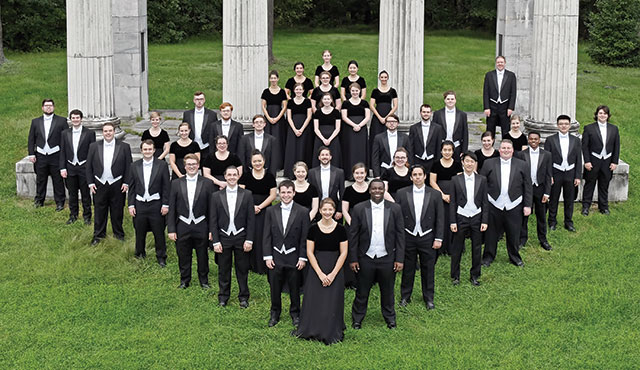They may share the same name and are both internationally renowned choral groups. But make no mistake: It is the American Westminster Choir, and not the British Westminster Cathedral Choir, that will be visiting Christ Cathedral in Garden Grove this Saturday, Jan. 18, at 8 p.m.
“It’s no problem at all to tell the two apart,” said David Ball, Christ Cathedral organist and assistant director of Music Ministries. “The (London-based) Westminster Cathedral Choir is a traditional, liturgical-sounding men-and-boys’ choir with a very English style of singing; while our Westminster Choir has mixed voices of college-aged men and women that produce a celestial sound, a more adult, unique sound. And the Westminster Choir College is centered around how to make that sound into an art-form.” The College is a feeder school for the Choir.
“Having the choir come here after the amazing renovation we’ve had at Christ Cathedral, with acoustics that lend themselves perfectly, is a treat for both performer and listener alike,” continued Ball, who added that Christ Cathedral has a special affinity with Westminster Choir College, having no less than five alumni among its professional ranks, including Dr. John Romeri (Class of ’74), Cathedral Director of Music Ministries.
Based in Princeton, New Jersey since 1934, the Grammy Award-winning Westminster Choir (no “Cathedral”) is currently on its Western U.S. phase of a yearlong centennial tour of the country, the Orange County visit being its only appearance in Southern California and fourth of five stops (Seattle, Boise, Salt Lake City and, after Christ Cathedral, La Jolla being the others) in a 10-day span (Jan. 10-19). The tour will culminate with the annual Tour Homecoming Concert in Princeton Jan. 27, to be broadcast live worldwide.
The choir’s program, titled “Appear and Inspire,” will include Sir Benjamin Britten’s “Hymn to Saint Cecilia,” Op. 27 (1942), one of the most sonorous choral works by the British composer.
A surprising name on the program is that of Arnold Schoenberg, Austrian-born naturalized-American composer who, having fled Nazi Germany, settled in Los Angeles and taught for many years at UCLA and USC. By then he had already developed a style of writing called dodecaphonic, or 12-tone music, which shatters the concept of tonality in many of his works. But “Friede auf Erden” (Peace on Earth), Op. 13, for eight-part chorus, is not one of them. It is an early (1907) work, therefore still rooted in tonality (good news for tonal-loving people).
Westminster Choir College faculty and alumni are represented on the program. “Psalm 96: Sing unto the Lord a New Song,” written by music professor Christian Carey, commemorates the choir’s centennial. Daniel Elder, one of Carey’s former students, who graduated with a master’s degree in composition in 2012, has his setting of “O Magnum Mysterium” presented. (Morten Lauridsen made a famous setting of it in 1994.)
Westminster Choir College operated independently from 1934 (its move to Princeton) until 1991, when it merged with Rider College to become part of Rider University. Despite budgetary woes at Rider threatening the college’s very existence, Westminster Choir forges ahead with its busy centennial season.
“That school is in need of support,” Ball said. “Hope their future is bright and long and that they’ll continue carrying the torch for the American choral tradition. “It’s a gem of the American musical college scene.”

